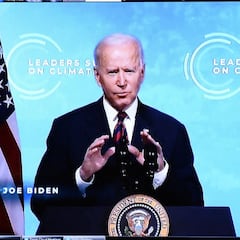COP26: What was India and China’s last minute change to the climate crisis agreement?
The climate change summit has ended with vital agreement between the 197 nations in attendance, but the Glasgow Climate Pact was weakened by a late amendment.


The near-200 nations in Glasgow, Scotland for the COP26 climate change summit finally reached an agreement on Saturday, bringing to a close weeks of negotiations on the use of fossil fuels in future.
In previous iterations of the COP summit, nations have never previously agreed to acknowledge that the burning of fossil fuels is the key cause of the climate crisis, something which was finally been included in the written agreement.
However a late intervention by India, backed by China, watered down the language relating to the use of coal and many climate experts have warned that the text does not reflect the urgent nature of the crisis.
What was the India-China COP26 change?
Coal had been a key focus throughout talks in Glasgow as the single biggest source of greenhouse gases. Accordingly, Alok Sharma, COP26 President, had wanted a commitment to phasing out the use of coal in energy production to be included in the final agreement.
However India petitioned those gathered to amend the language of the Glasgow Climate Pact, insisting that countries should be required to “phase down” rather than “phase out” the use of coal. This means that countries have only pledged to reduce their consumption of coal, rather than working towards eliminating it entirely.
A moment in history
— Alok Sharma (@AlokSharma_RDG) November 13, 2021
The Glasgow Climate Pact is agreed#COP26 | #TogetherForOurPlanet pic.twitter.com/qq4ygsokXm
The India-China amendment was the only change proposed in the final session of the summit on Saturday and was agreed to by all 197 countries in attendance. The final text pledges to “accelerat[e] efforts towards the phase down of unabated coal power and phase out of inefficient fossil fuel subsidies.”
Why did India want the coal commitment altered?
One of the key challenges for COP26 and other global climate change summits is that they seek to find agreement between nations of vastly different social, political and economic characteristics.
India relies heavily on coal, using the fossil fuel for around 70% of its energy production. Four million people are currently employed in the county’s vast coal industry.
Despite having the world's sixth largest economy, India is still considered a developing country and Bhupender Yadav, India’s environment minister, said that the nation was not capable of weaning itself away from coal entirely.
“How can anyone expect that developing countries make promises about phasing out coal and fossil fuels subsidies?” Yadav asked, earlier in the summit. “Developing countries still have to deal with their poverty reduction agenda.”
India's environment and climate minister said the watering down of language on phasing out coal was needed to reflect the 'national circumstances of emerging economies' https://t.co/VcPdxmg2ky #COP26 pic.twitter.com/q077sYiqXU
— Reuters (@Reuters) November 13, 2021
However while the COP26 agreement does mark a step forward in terms of the international cooperation, there is clear frustration that an eleventh-hour amendment has weakened the Glasgow Climate Pact.
Related stories

How much will the sea level rise by 2050?
UN secretary-general António Guterres said that the agreement “reflects the interests, the conditions, the contradictions and the state of political will in the world today.”
However he admitted that: “Unfortunately, the collective political will was not enough to overcome some deep contradictions.”
